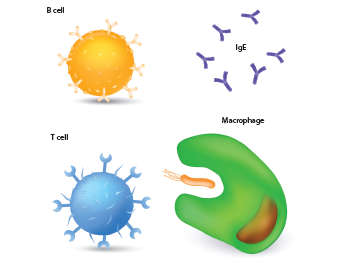
This figure illustrates immune system cells, including a macrophage, T cell, B cell and antibodies.
Designua / shutterstock.com
SAN DIEGO—B cell signaling goes awry in many patients with systemic lupus erythematosus (SLE), triggering pathogenic autoimmune responses and clinical disease. At the Rheumatology Research Foundation’s 2017 Evelyn V. Hess Memorial Lecture, held on Nov. 5 at the ACR/ARHP Annual Meeting, researcher Ignacio Sanz, MD, discussed B cells’ role in this complex disease.
Because lupus comprises multiple cell types during disease pathogenesis, and multiple mediators and signaling pathways that may contribute to disease, why do we need to emphasize B cells?
“Most of the disease risk alleles map to B cell pathways.1 SLE is characterized by multiple autoantibodies in very large amounts, and B cells also play autoantibody-independent functions that can be pathogenic,” including cytokine production, antigen presentation,
T cell activation and formation of tertiary lymphoid tissues, said Dr. Sanz, professor of medicine and pediatrics, chief of rheumatology and director of the Lowance Center for Human Immunology at Emory University, Atlanta. It is still unclear whether B cell therapies, such as rituximab, will be effective for some patient groups, such as African Americans with lupus nephritis.2
B cell depletion is highly variable in SLE, with two clear patterns: very profound depletion followed by repopulation with new B cells in patients who fare well long term, and “then another pattern [in which] patients might be declared complete B cell depletors by clinical standards, but in fact, they are not, and they tend to repopulate with memory cells and not do well,” said Dr. Sanz. These patients may not respond to such therapies as rituximab, he said. “You can deplete the B cells of a group of patients who are B cell dependent, and they will do well. The challenge is to recognize those patients and then, achieve that degree of depletion.”
Heterogeneous Disease
Researchers typically look at B cells in humans just by surface phenotypes or functional assays that scratch only the surface, said Dr. Sanz. To learn how B cells are programmed, or the mechanisms and directions they follow in the disease process, an immunomics approach works better.
Serum autoantibodies are analyzed in an SLE patient’s blood, kidney tissue, urine and bone marrow, then the researchers sequence the autoantibodies of most interest, including the immunoproteomics that help identify the dominant clones and B cell repertoire involved in disease activity. Through various sequencing techniques, the B cell repertoire is matched with the serum autoantibodies, “so we can understand the different profiles and classes of disease based on B cell signatures,” he said. “Then, we extract RNA and DNA from subsets of interests so we can study their molecular programs transcriptionally and epigenetically.”
